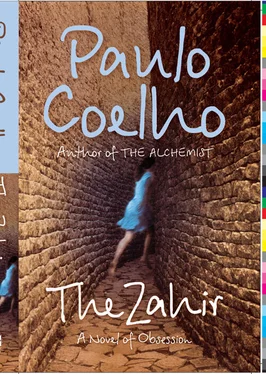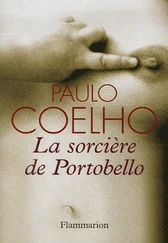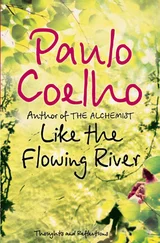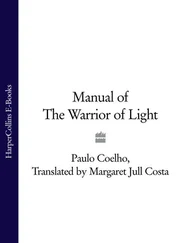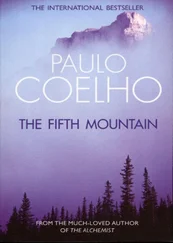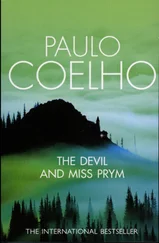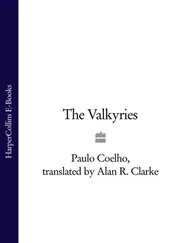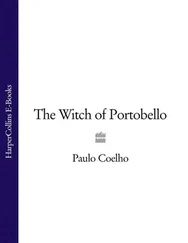Or should I say memories of my ex-wife (I needed to get used to the term).
Part of what I had foreseen in that hotel room did come to pass. For a while, I barely left the apartment: I didn’t know how to face my friends, how to look them in the eye and say simply: ‘My wife has left me for a younger man.’ When I did go out, no one asked me anything, but after a few glasses of wine I felt obliged to bring the subject up – as if I could read everyone’s mind, as if I really believed that they had nothing more to occupy them than what was happening in my life, but that they were too polite or smug to say anything. Depending on my mood, Esther was either a saint who deserved better, or a treacherous, perfidious woman who had embroiled me in such a complicated situation that I had even been thought a criminal.
Friends, acquaintances, publishers, people I sat next to at the many gala dinners I was obliged to attend, listened with some curiosity at first. Gradually, though, I noticed that they tended to change the subject; they had been interested in the subject at some point, but it was no longer part of their current curiosities: they were more interested in talking about the actress who had been murdered by a singer or about the adolescent girl who had written a book about her affairs with wellknown politicians. One day, in Madrid, I noticed that the number of guests at events and suppers was beginning to fall off. Although it may have been good for my soul to unburden myself of my feelings, to blame or to bless Esther, I began to realise that I was becoming something even worse than a betrayed husband: I was becoming the kind of boring person no one wants to be around.
I decided, from then on, to suffer in silence, and the invitations once more flooded in through my letter box.
But the Zahir, about which I initially used to think with either irritation or affection, continued to grow in my soul. I started looking for Esther in every woman I met. I would see her in every bar, every cinema, at bus stops. More than once I ordered a taxi driver to stop in the middle of the street or to follow someone, until I could persuade myself that the person was not the person I was looking for.
With the Zahir beginning to occupy my every thought, I needed an antidote, something that would not take me to the brink of despair.
There was only one possible solution: a girlfriend.
I encountered three or four women I felt drawn to, but then I met Marie, a 35-year-old French actress. She was the only one who did not spout such nonsense as: ‘I like you as a man, not as the celebrity everyone wants to meet’ or ‘I wish you weren’t quite so famous’, or worse still: ‘I’m not interested in money.’ She was the only one who was genuinely pleased at my success, because she too was famous and knew that celebrity counts. Celebrity is an aphrodisiac. It was good for a woman’s ego to be with a man and know that he had chosen her even though he had had the pick of many others.
We were often seen together at parties and receptions; there was speculation about our relationship, but neither she nor I confirmed or denied anything, and the matter was left hanging, and all that remained for the magazines was to wait for the photo of the famous kiss – which never came, because both she and I considered such public exhibitionism vulgar. She got on with her filming and I with my work; when I could, I would travel to Milan, and when she could, she would meet me in Paris; we were close, but not dependent on each other.
Marie pretended not to know what was going on in my soul, and I pretended not to know what was going on in hers (an impossible love for a married neighbour, even though she could have had any man she wanted). We were friends, companions, we enjoyed the same things; I would even go so far as to say that there was between us a kind of love, but different from the love I felt for Esther or that Marie felt for her neighbour.
I started taking part in book-signings again, I accepted invitations to give lectures, write articles, attend charity dinners, appear on television programmes, help out with projects for up-and-coming young artists. I did everything except what I should have been doing, i.e. writing a book.
This didn’t matter to me, however, for in my heart of hearts I believed that my career as a writer was over, because the woman who had made me begin was no longer there. I had lived my dream intensely while it lasted, I had got farther than most people are lucky enough to get, I could spend the rest of my life having fun.
I thought this every morning. In the afternoon, I realised that the only thing I really liked doing was writing. By nightfall, there I was once more trying to persuade myself that I had fulfilled my dream and should try something new.
The following year was a Holy Yearin Spain, the Año Santo Compostelano , which occurs whenever the day of St James of Compostela, 25 July, falls on a Sunday. A special door to the Cathedral in Santiago stands open for 365 days, and, according to tradition, anyone who goes through that door receives a series of special blessings.
There were various commemorative events throughout Spain, and since I was extremely grateful for the pilgrimage I had made, I decided to take part in at least one event: a talk, in January, in the Basque country. In order to get out of my routine – trying to write a book/going to a party/to the airport/visiting Marie in Milan/going out to supper/to a hotel/to the airport/surfing the Internet/going to the airport/to an interview/to another airport – I chose to drive the 1,400 kilometres there alone.
Everywhere – even those places I have never visited before – reminds me of my private Zahir. I think how Esther would love to see this, how much she would enjoy eating in this restaurant or walking by this river. I spend the night in Bayonne and, before I go to sleep, I turn on the television and learn that there are about 5,000 trucks stuck on the frontier between France and Spain, due to a violent and entirely unexpected snowstorm.
I wake up thinking that I should simply drive back to Paris: I have an excellent excuse for cancelling the engagement, and the organisers will understand perfectly – the traffic is in chaos, there is ice on the roads, both the French and Spanish governments are advising people not to leave home this weekend because the risk of accidents is so high. The situation is worse than it was last night: the morning paper reports that on one stretch of road alone there are 17,000 people trapped; civil defence teams have been mobilised to provide them with food and temporary shelters, since many people have already run out of fuel and cannot use their car heaters.
The hotel staff tell me that if I really have to travel, if it’s a matter of life or death, there is a minor road I can take, which, while it will avoid the blockages, will add about two hours to my journey time, and no one can guarantee what state the road will be in. Instinctively, I decide to go ahead; something is forcing me on, out onto the icy asphalt and to the hours spent patiently waiting in bottlenecks.
Perhaps it is the name of the city: Vitória – Victory. Perhaps it is the feeling that I have grown too used to comfort and have lost my ability to improvise in crisis situations. Perhaps it is the enthusiasm of the people who are, at this moment, trying to restore a cathedral built many centuries ago and who, in order to draw attention to their efforts, have invited a few writers to give talks. Or perhaps it is the old saying of the conquistadors of the Americas: ‘it is not life that matters, but the journey’.
And so I keep on journeying. After many long, tense hours, I reach Vitória, where some even tenser people are waiting for me. They say that there hasn’t been a snowstorm like it for more than thirty years, they thank me for making the effort, and continue with the official programme, which includes a visit to the Cathedral of Santa María.
Читать дальше
